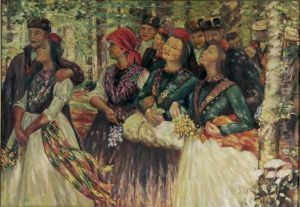Karl Francis Bantzer Paintings
Karl Francis Bantzer was a prominent German painter, born on August 10, 1857, in Zierenberg, Hesse-Kassel (or Hesse-Cassel), in the German Confederation. His artistic journey began at the Kassel Art Academy, where he honed his skills and developed a foundation that would influence his entire career. Bantzer's education continued as he furthered his studies at the Munich Academy, one of the most prestigious art schools in Germany at the time. Here, he was exposed to a variety of styles and techniques, which played a critical role in shaping his unique approach to painting.
Throughout his career, Bantzer was known for his exceptional talent in depicting rural life and landscapes, with a particular focus on the Hessian region. His works are celebrated for their detailed realism, sensitivity to light, and the subtle interplay of colors. Bantzer had a keen ability to capture the essence of his subjects, portraying not just their physical appearance but also hinting at the socio-economic conditions of rural Germany during his lifetime.
Bantzer was also an active member of the Willingshausen Painter's Colony, a group of like-minded artists who gathered in the small village of Willingshausen to paint and draw inspiration from the surrounding countryside. This association further influenced his artistic direction, embedding his work within the broader context of the German plein air painting tradition of the late 19th and early 20th centuries.
Despite the changes in artistic trends over the years, Bantzer remained committed to his realist roots, though his later works occasionally reflected the influence of Impressionism, particularly in his treatment of light and color. His dedication to portraying the rural landscapes and people of his homeland earned him a significant place in the German art scene of his time.
Karl Francis Bantzer's contributions to German art were recognized with numerous awards and honors throughout his career. He continued to paint and contribute to the art world until his death on December 5, 1941, in Kassel, Germany. Today, his works are held in high regard and can be found in museums, galleries, and private collections, both in Germany and internationally. Through his paintings, Bantzer has left behind a lasting legacy that continues to inspire and captivate audiences with its timeless beauty and historical insight.

